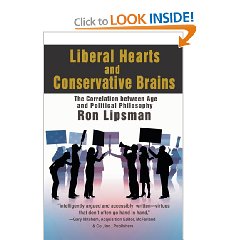 Comes at a Good Time, Worth Considering, February 12, 2008
Comes at a Good Time, Worth Considering, February 12, 2008
Ron Lipsman
What I like most about this book is its side by side comparisons of liberals and conservatives, as well as its chart of where they agree.
The author is a self-professed devout Jew who converted from liberal young heart to conservative older mind as he grew older, aided by time in Israel.
Published in 2007, the book is unusual, almost a personal cry of the heart and brain. I agree with the other authors, there are some gaps here, not least of which is the work described in The Cultural Creatives: How 50 Million People Are Changing the World and in Blessed Unrest: How the Largest Movement in the World Came into Being and Why No One Saw It Coming. See also Reuniting America and its definition of transpartisanship (bipartisanship is code for the continuation of the two-party organized crime/spoils system that excludes Independents, Libertarians, Naderites, Greens, Reforms, and others). The “new progressives” are not in this book.
So, to put it mildly, the book does a good job of exploring what it means to be a liberal or a conservative, and how that correlates with age, but it is not a sweeping nuanced view of all the alternatives.
On page 25 the author tells us that Liberals and Conservatives share:
+ Patriotism/Love of Country
+ Respect for the Law
+ Devotion to Family
+ Optimism/Faith in America
+ Prosperity/Economic Progress
+ Love Thy Neighbor
+ Tolerance
+ Civilian Control of the Military
+ Don't Tread on Me
+ Your Home Is Your Castle
+ Veneration of Education
+ Leisure
The author–and no doubt much of the books was written years ago–has been slow to see the rise of extremism on both sides, the dismissal of the law by Dick Cheney and Mike Hayden among others, and the general collapse of our society, now a The Cheating Culture: Why More Americans Are Doing Wrong to Get Ahead.
Although the book can be criticized for being “one man's view,” it is never-the-less to be admired for being offered to us, and I for one found parts of it helpful.
Early on the author has two columns that capture his view of where liberals and conservatives differ:
+ Government spending
+ Taxes
+Regulations
+ Welfare
+ Military spending
+ UN versus US leadership
+ Multilateral versus unilateral
+ Abortion versus pro-life
+ Marriage
+ Diversity
+ Protectionism versus Free Trade (no mention of fair trade)
+ Wages
+ Environment
+ Animal versus Human Rights
+ Church & State
+ Illegal Aliens
+ Social Justice versus Rugged Individualism
+ Treatment of Criminals
+ Capital punishment
+ Gun Control or not
+ Constituionality
+ Group versus Individual Rights
+ Broadening versus Preserving “American Culture”
The author then goes on to describe and evaluate at length.
This is an excellent book for a political philosophy course.
Other books I recommend to complement this one:
Statecraft as Soulcraft
Public Philosophy: Essays on Morality in Politics
Radical Man: The Process of Psycho-Social Development
The Left Hand of God: Taking Back Our Country from the Religious Right
American Fascists: The Christian Right and the War On America
What We Say Goes: Conversations on U.S. Power in a Changing World
All Rise: Somebodies, Nobodies, and the Politics of Dignity (BK Currents)


